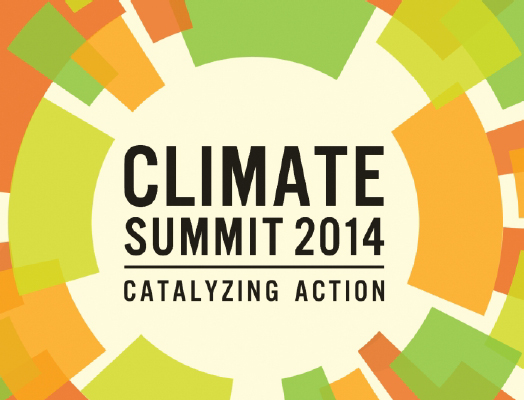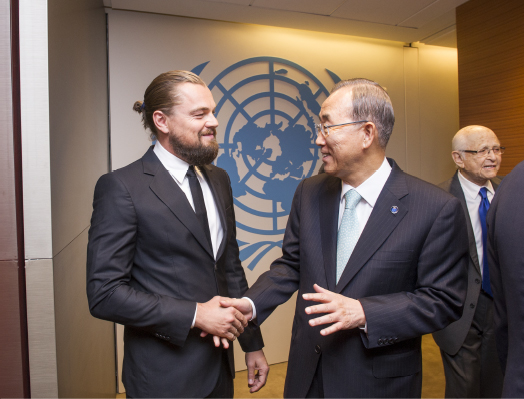
World Nations Act Together to Address Climate Change
On 23th September 2014, United Nations Secretary-General Ban Ki-moon hosted the UN Climate Summit at the UN Headquarters in New York City. With the tagline 'Catalysing Change', the summit served as a public platform for political, finance, business, and civic leaders to catalyse action on the ground to reduce emissions as well as mobilize political will for an ambitious global agreement by 2015 that limits the world to a less than 2⁰C rise in global temperature.
DeCaprio's Speech
The summit's opening ceremony included speeches by Ban Ki-moon, Al Gore, former US Vice President; Li Bingbing, Chinese actress and Goodwill Ambassador of the UN Environment Programme; and Leonardo DiCaprio, actor and UN Messenger of Peace. DiCaprio's speech emphasized that climate change is a real problem that cannot be ignored any longer. He said, 'I play fictitious characters often solving fictitious problems. I believe that mankind has looked at climate change in that same way. As if pretending that climate change wasn't real would somehow make it go away, but I think we all know better than that now.' He went on to say that, 'Every week we're seeing new and undeniable climate events, evidence that accelerated climate change is here right now. None of this is rhetoric, and none of it is hysteria. It is fact.' DiCaprio finished his speech by calling on the assembly to act on climate change, and to do so now. This speech received immediate global attention and was shared and re-shared widely on social media and traditional news channels over the next few days.

Thematic Sessions
During the summit, four 75-minute thematic sessions were held, each co-chaired by a head of state from a developing country and a developed country, and hosted by one or more UN entities. Each session featured a moderated discussion among four panel speakers. The four sessions cover essential facets of the global climate change discussion: climate science; the co-benefits of climate action with a focus on health and jobs; the economic case for climate action; and voices from the climate front lines (including the views of women, youth, indigenous and other vulnerable populations). These sessions were important to ensure that the diverse voices of those with a stake in the climate change were heard.

Action Areas
Eight action areas were discussed at the Summit: Agriculture, Cities, Energy, Financing, Forests, Industry, Resilience, and Transportation. Within each action area the main issue is identified and specific commitments to addressing the issues were discussed and made. For example, in the Cities Action Area, it was identified that 60 per cent of the world's population will live in cities by 2030, and that figure will rise to 70 per cent by 2050. Currently cities are responsible for about 70 per cent of global greenhouse emissions gas. Thus, working with mayors of cities to reduce these emissions would be critical in reducing these emissions. At the same time, as the cities' populations surge over the coming decades, many cities will be struggling to ensure that their infrastructure is adequate to support population growth. Climate change increases the risk of stress to water, sewer, drainage, and transportation systems, as well as infrastructure, and therefore lead to even more struggles in the future for cities to meet their infrastructural needs.
At the summit, mayors from well over 2,000 cities gathered to make voluntary commitments to reduce emissions by 454 Megatons by 2020. In addition, about 20 public and private sector partners also united to launch the City Climate Finance Leadership Alliance in order to stimulate investments in low-carbon and climate-resistant infrastructure in cities in low- and middle-income countries.
Steps Forward
Although the Summit did not enact sweeping policy changes or adopt a new global strategy to combat climate change, there were some important steps made by political and financial leaders to ensure change in the future. Perhaps the biggest tangible result of the summit was a commitment by nearly 40 private sector companies to do their part to slow and eventually stop the loss of forests. The companies include multi-national corporations such as Asia Pulp and Paper, Kellogg's, Nestle, Johnson & Johnson, Walmart, and Procter & Gamble.
Another important set of commitments were financial commitments to the Green Climate Fund, a fund established by wealthier countries to help poorer countries invest in clean energy and mitigate their risks from climate change. At the summit, France and Germany both offered US$1 billion towards this fund. South Korea increased its contribution to US$100 million. Denmark, Norway, Mexico, Luxembourg, and Indonesia also made pledges.
Commitments by the private and public sectors such as these made at the summit ensure that there is a global solution to the global issue of climate change.



